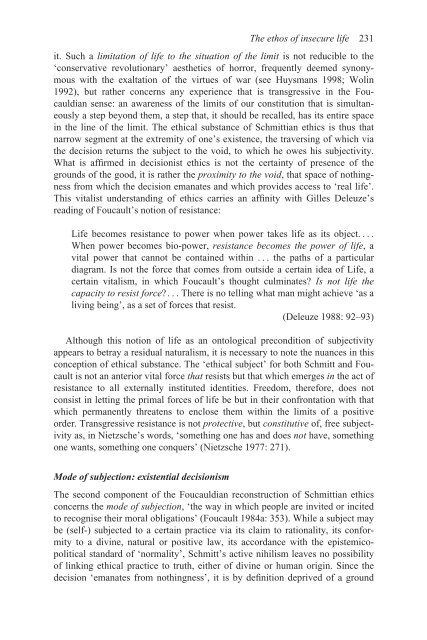The International Political Thought of Carl Schmitt: Terror, Liberal ...
The International Political Thought of Carl Schmitt: Terror, Liberal ...
The International Political Thought of Carl Schmitt: Terror, Liberal ...
You also want an ePaper? Increase the reach of your titles
YUMPU automatically turns print PDFs into web optimized ePapers that Google loves.
<strong>The</strong> ethos <strong>of</strong> insecure life 231<br />
it. Such a limitation <strong>of</strong> life to the situation <strong>of</strong> the limit is not reducible to the<br />
‘conservative revolutionary’ aesthetics <strong>of</strong> horror, frequently deemed synonymous<br />
with the exaltation <strong>of</strong> the virtues <strong>of</strong> war (see Huysmans 1998; Wolin<br />
1992), but rather concerns any experience that is transgressive in the Foucauldian<br />
sense: an awareness <strong>of</strong> the limits <strong>of</strong> our constitution that is simultaneously<br />
a step beyond them, a step that, it should be recalled, has its entire space<br />
in the line <strong>of</strong> the limit. <strong>The</strong> ethical substance <strong>of</strong> <strong>Schmitt</strong>ian ethics is thus that<br />
narrow segment at the extremity <strong>of</strong> one’s existence, the traversing <strong>of</strong> which via<br />
the decision returns the subject to the void, to which he owes his subjectivity.<br />
What is affirmed in decisionist ethics is not the certainty <strong>of</strong> presence <strong>of</strong> the<br />
grounds <strong>of</strong> the good, it is rather the proximity to the void, that space <strong>of</strong> nothingness<br />
from which the decision emanates and which provides access to ‘real life’.<br />
This vitalist understanding <strong>of</strong> ethics carries an affinity with Gilles Deleuze’s<br />
reading <strong>of</strong> Foucault’s notion <strong>of</strong> resistance:<br />
Life becomes resistance to power when power takes life as its object....<br />
When power becomes bio-power, resistance becomes the power <strong>of</strong> life, a<br />
vital power that cannot be contained within . . . the paths <strong>of</strong> a particular<br />
diagram. Is not the force that comes from outside a certain idea <strong>of</strong> Life, a<br />
certain vitalism, in which Foucault’s thought culminates? Is not life the<br />
capacity to resist force? . . . <strong>The</strong>re is no telling what man might achieve ‘as a<br />
living being’, as a set <strong>of</strong> forces that resist.<br />
(Deleuze 1988: 92–93)<br />
Although this notion <strong>of</strong> life as an ontological precondition <strong>of</strong> subjectivity<br />
appears to betray a residual naturalism, it is necessary to note the nuances in this<br />
conception <strong>of</strong> ethical substance. <strong>The</strong> ‘ethical subject’ for both <strong>Schmitt</strong> and Foucault<br />
is not an anterior vital force that resists but that which emerges in the act <strong>of</strong><br />
resistance to all externally instituted identities. Freedom, therefore, does not<br />
consist in letting the primal forces <strong>of</strong> life be but in their confrontation with that<br />
which permanently threatens to enclose them within the limits <strong>of</strong> a positive<br />
order. Transgressive resistance is not protective, but constitutive <strong>of</strong>, free subjectivity<br />
as, in Nietzsche’s words, ‘something one has and does not have, something<br />
one wants, something one conquers’ (Nietzsche 1977: 271).<br />
Mode <strong>of</strong> subjection: existential decisionism<br />
<strong>The</strong> second component <strong>of</strong> the Foucauldian reconstruction <strong>of</strong> <strong>Schmitt</strong>ian ethics<br />
concerns the mode <strong>of</strong> subjection, ‘the way in which people are invited or incited<br />
to recognise their moral obligations’ (Foucault 1984a: 353). While a subject may<br />
be (self-) subjected to a certain practice via its claim to rationality, its conformity<br />
to a divine, natural or positive law, its accordance with the epistemicopolitical<br />
standard <strong>of</strong> ‘normality’, <strong>Schmitt</strong>’s active nihilism leaves no possibility<br />
<strong>of</strong> linking ethical practice to truth, either <strong>of</strong> divine or human origin. Since the<br />
decision ‘emanates from nothingness’, it is by definition deprived <strong>of</strong> a ground
















